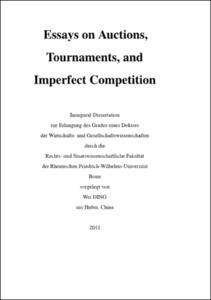Essays on Auctions, Tournaments, and Imperfect Competition

Essays on Auctions, Tournaments, and Imperfect Competition

| dc.contributor.advisor | Schöttner, Anja | |
| dc.contributor.author | Ding, Wei | |
| dc.date.accessioned | 2020-04-16T14:04:00Z | |
| dc.date.available | 2020-04-16T14:04:00Z | |
| dc.date.issued | 30.09.2011 | |
| dc.identifier.uri | https://hdl.handle.net/20.500.11811/4870 | |
| dc.description.abstract | This thesis is a collection of essays in applied microeconomic theory. It is composed of three parts. Part I (Procurement of innovation: tournaments vs auctions) deals with the procurement of innovations and compares the performance of two prominent procurement mechanisms: scoring auctions and fixed-prize tournaments. Unlike the literature, we assume that the procurer cannot commit himself to never bargain with anyone who bypassed the given mechanism. Under this condition, innovators with high value innovations may gain more from bypassing the mechanism and instead speculate on bargaining with the procurer after the mechanism has been completed. As a result, it may occur that only lemons, i.e., only low value innovations, are submitted. Altogether, we show that fixed-prize tournaments are more suitable to handle the bypass problem than auctions, and the optimal fixed-prize tournament is more profitable for the procurer than the optimal auction. Part II (Strategic information transmission in sequential auctions) deals with issues of strategic information transmission that occur if bidders participate in a sequence of auctions and bidders' valuations are correlated across auctions. In such a framework, the outcome of the early auction may reveal information concerning bidders' valuations which may adversely affect their expected payoffs in later auctions. Of course, bidders take into account that their bids affects others' beliefs, and adjust their bidding behavior in such a way that the inference from observed bids to underlying valuations is blurred, to which we refer as a case of signal jamming. Part III (Signaling in market games with downstream interaction) focuses on the interaction between strategic behavior and subsequent downstream interaction in an oligopoly aftermarket, using the examples of wage bargaining and takeover bidding. The common feature in both applications is that the negotiated wages resp. the observed winning bid in a takeover contest serve as a signal of the respective players' type, which affects the interaction in the downstream oligopoly market. Players take this signaling aspect into account, which may give rise to inflated equilibrium wages respectively takeover bids. | en |
| dc.language.iso | eng | |
| dc.rights | In Copyright | |
| dc.rights.uri | http://rightsstatements.org/vocab/InC/1.0/ | |
| dc.subject | Mikroökonomische Theorie | |
| dc.subject | Informationsökonomie | |
| dc.subject | Angewandte Spieltheorie | |
| dc.subject | Auktionen und Turniere | |
| dc.subject | Industrieökonomie | |
| dc.subject | Microeconomic Theory | |
| dc.subject | Economics of Information | |
| dc.subject | Applied Game Theory | |
| dc.subject | Auctions and Tournaments | |
| dc.subject | Industrial Organization | |
| dc.subject.ddc | 330 Wirtschaft | |
| dc.title | Essays on Auctions, Tournaments, and Imperfect Competition | |
| dc.type | Dissertation oder Habilitation | |
| dc.publisher.name | Universitäts- und Landesbibliothek Bonn | |
| dc.publisher.location | Bonn | |
| dc.rights.accessRights | openAccess | |
| dc.identifier.urn | https://nbn-resolving.org/urn:nbn:de:hbz:5-26514 | |
| ulbbn.pubtype | Erstveröffentlichung | |
| ulbbnediss.affiliation.name | Rheinische Friedrich-Wilhelms-Universität Bonn | |
| ulbbnediss.affiliation.location | Bonn | |
| ulbbnediss.thesis.level | Dissertation | |
| ulbbnediss.dissID | 2651 | |
| ulbbnediss.date.accepted | 08.09.2011 | |
| ulbbnediss.fakultaet | Rechts- und Staatswissenschaftliche Fakultät | |
| dc.contributor.coReferee | Kräkel, Matthias |
Dateien zu dieser Ressource
Das Dokument erscheint in:
-
E-Dissertationen (288)




